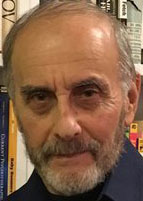Tragically, the beat of duplicity continues with impunity. Azerbaijani president Ilham Aliyev told delegates and heads of state attending COP29 in his country that natural gas was a "gift from God" and he shouldn't be blamed for bringing it to market. Earlier, the BBC reported that "a senior Azerbaijani official appeared to have used his role at COP to arrange a meeting to discuss potential fossil fuel deals".
And the U.S., second only to China among carbon-polluting nations, is about to seal its surrender to climate change. Chris Wright, Donald Trump's pick for Secretary of the Department of Energy, is CEO of a Denver fossil fuel company. According to Euro News, "Wright is a vocal advocate of oil and gas development, including fracking, a key pillar of Trump's quest to achieve US energy dominance in the global market."
Isn't it time to face the truth: treaties will continue to fail as commitments are not met and production of fossil fuel continues at present levels or increased production? The failure will be especially acute because of regime changes and likely disruptions from military and economic crises. Isn't it time to scrap the current strategies and embrace one with a realistic promise of defeating climate change before we encounter what UN Secretary-General Antonio Guterrez called the fast-approaching "climate hell"?
The brake/accelerator metaphor mandates that the war on climate change be taken out of the hands of nations and corporations and placed in the care of a new independent entity. An internationally funded operation modeled after the Manhattan Project. It would focus on a limited number of projects that have proven ability to defeat climate change if developed to full functionality A prime candidate is nuclear fusion. If fully developed it could produce unlimited amounts of clean energy with virtually no radioactive waste, unlike current nuclear fission plants. While there are formidable obstacles to bringing nuclear fusion to full commercial operation, recent breakthroughs remind us that science has a history of achieving the "impossible" when given the resources. Both the moon landing in 1969 and the success of nuclear fission (the Manhattan Project) in 1945 which ended World War II, inspire hope that science can do it again.
On May 25, 1961, President John F. Kennedy, speaking to a joint session of Congress, set the electrifying goal of a moon landing within the decade. Although scientists knew little about space travel, we made it to the moon in just eight years. Scientists today know a great deal about nuclear science. Let's set a goal for The Comercial Functionality Of Nuclear Fusion Within A Decade.
Scientists warn that time is running out. We have a choice: either a bold commitment to focus sharply on a technology that can defeat climate change if fully developed or a decision to double down on failed strategies and watch the theater of the absurd play out.
In deference to nature, viewing the show from high ground is strongly recommended.
(Article changed on Jan 05, 2025 at 11:07 PM EST)
(Note: You can view every article as one long page if you sign up as an Advocate Member, or higher).





